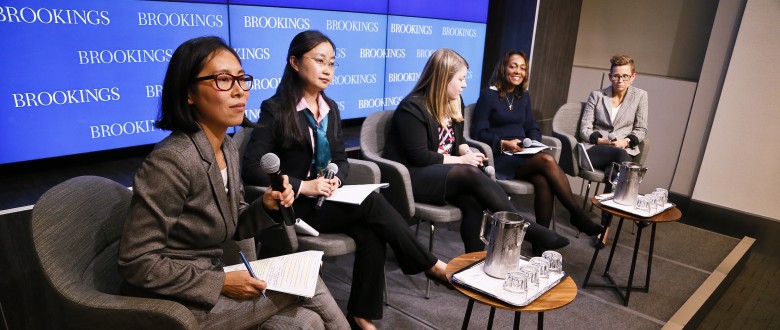
When research points out that gender stereotypes are fixed in children’s mindsets by the age of 5 already, we seriously have to question why most gender-related interventions in education are focused on adolescents rather than preschoolers. This is precisely what we did alongside other panellists at the Brookings annual Girls Education Research and Policy Symposium in November, where we also teased our upcoming toolkit for gender-responsive pedagogy in early childhood education.
Why gender in early childhood matters
Until very recently, little to no attention was given to gender in the early childhood settings of children below the age of 10. This is a contradiction, as science has clearly shown that by this age, children’s brains have fully developed, and stereotypes are thus already ingrained in their mindsets. Questions as to whether interventions aimed at adolescent boys and girls – to where most of the attention is directed when it comes to gender – alone are the most effective, are legitimate.
In these discussions, teachers are probably the most crucial subject. These authority figures also have their beliefs about gender, and these beliefs impact how they interact with their learners and which teaching materials they use, such as stereotypical toys or textbooks with sexist images. Ultimately, this reinforces and transfers gender stereotypes onto children, which can impact children’s wellbeing, self-confidence and learning outcomes.
Panel at the Brookings symposium
Luckily, the research community is also recognising the important influence teachers have on a child’s development and the need to investigate this further. At the Brookings symposium, VVOB shared a panel with other experts on gender in education.
VVOB’s Partnership Manager Anna Murru (right) added to the conversation with our own research from Vietnam, that clearly showed that teachers don’t leave their stereotypical thinking about gender or ethnicity at the classroom door. It also suggested that a pedagogy of active teaching and learning that puts the wellbeing and involvement of learners at its centre, makes teachers self-reflect and address their stereotypical thinking and attitudes.

You can find a full recording of the panel ‘Making a Case for Early Childhood Educators in the Girls’ Education Ecosystem’ below.
Panellists from left to right:
- Christina Kwauk (moderator): Fellow at Global Economy and Development, Center for Universal Education
- Jin Chi: Echidna Global Scholar, programme specialist at UNESCO INRULED, associate professor at Beijing Normal University
- Kristin Shutts: associate professor of Psychology at the University of Wisconsin-Madison
- Anna Murru: partnership manager at VVOB – education for development
- Christia Spears Brown: director at the Center for Equality and Social Justice, professor of Developmental Psyhology at the University of Kentucky
GRP4ECE: toolkit for teachers
In short, the global teaching workforce – this includes school leaders and ministry of education staff too – needs to have the knowledge and skills necessary to be fully gender-responsive and to advance educational goals for both girls and boys, who are also affected by harmful stereotypes. Capacity building of the relevant institutions and their employers is an effective way, complemented by enough investments in research to identify, analyse and promote good practices across the world.
Members of the African Union have shown political commitment to this through several gender initiatives in early childhood education already. The partnership between VVOB and FAWE (Forum for African Women Educationalists) is flourishing in this conducive environment, pointing its arrows at as many teacher training institutions and teachers as possible across the continent for a deep understanding of gender-responsive pedagogy.

In February 2019, a joint FAWE-VVOB toolkit will be launched: ‘Gender-responsive Pedagogy for Early Childhood Education’, or GRP4ECE for short. The toolkit offers very concrete guidelines, tips and games for early childhood teachers to create gender-friendly and safe learning environments for our youngest.
Sign up to our Learn newsletter on our homepage and follow us on twitter (@VVOBvzw) for the latest!
Pictures: ©Brookings/Paul Morigi




